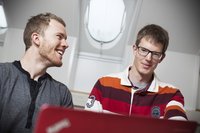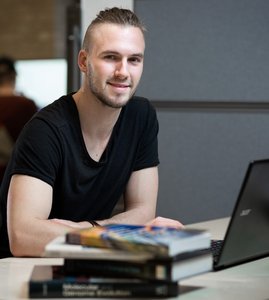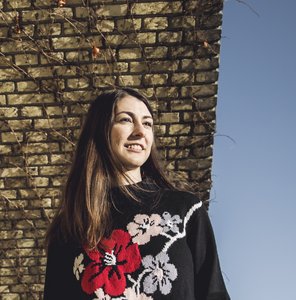Master's Degree Programme
| About the programme Language: English (See language requirements) | Place of study: Aarhus | Commencement: August / September (See if this programme also offers a January/February start for international applicants). |
Bioinformatics is a fusion of biology, statistics and computer science that focuses on the development and application of computational solutions for analysing and handling biological and biomedical data. The field of bioinformatics plays a key role in modern biology and biomedicine, where collecting and analysing large data sets is essential. To address the challenges of big data in modern biology and biomedicine, a bioinformatician must combine practical and theoretical skills in statistical modelling, data analysis, and computer programming with a deep knowledge of biology and biomedicine - a network of competencies that students will acquire through the two-year MSc in Bioinformatics programme at Aarhus University.
The MSc in Bioinformatics programme is open to all students with a BSc degree in the natural, technical or health sciences with a significant content of mathematical, biological, and/or computational subjects, such as a BSc degree in bioinformatics, biology, molecular biology, molecular medicine, mathematics, statistics or computer science. Students on the programme will be exposed to the many topics in bioinformatics through lectures, projects and exercise sessions; they will specialise in a bioinformatics subject during their thesis work, while also acquiring general competencies in data analysis and computer programming.
The MSc in Bioinformatics programme is both practical and research oriented. It reflects the interests of the business community, research institutions and the public sector. Students obtain skills within the development and application of computational solutions for analysing and handling data-intensive systems in general, and biological and biomedical systems in particular. Graduates are thus extremely well placed to find employment as bioinformatics specialists in the biotechnology or biomedical industry, or in other areas where computational analysis of large amounts of data are essential. They are also attractive to the IT industry as software developers.

We’ve worked on a number of assignments together during our studies, and now we’re both busy writing our MSc theses in collaboration with the Department of Molecular Medicine at Aarhus University hospital, where we share an office with three other students. Mathias and I are working on bladder cancer, and we have huge amount of data from cancer patients who’ve had tests done at the hospital. We compare the bladder cancer tests with blood tests from each patient to study changes in the cellular DNA that might have contributed to developing the disease. We use the same amount of data, but different statistical analysis methods. Our aim is to find significantly mutated genes, and possibly find the causes of the disease.
Mads Krogh Jensen and Mathias Brygger Hansen
MSc students at Bioinformatics
In this section you can learn more about the admission requirements relevant to the master's degree programme in Bioinformatics. Depending on your educational background and your qualifications, there are different ways to meet the admission requirements:
This section is relevant for you, if you have:
The two sections listed below are relevant only for students with a bachelor's degree from a Danish institution:
Below these sections, you can learn more about the English language requirement. You can also find out which ranking criteria we use to assess your application when prioritizing among the submitted applications.
If you have an international educational background, you must meet both the general admission requirement and the specific admission requirements:
You must have a bachelor's degree or equivalent that is comparable to a Danish bachelor's degree in both level and duration (180 ECTS).
For more information about how your bachelor's degree is assessed, please see the national database.
If you meet the general admission requirement, the university will continue on to assess whether or not you meet the specific admission requirements.
You can be admitted to the master's programme if the university assesses that your education has a level, scope, and content that corresponds to the academic requirements specified below.
| Subject area | Number of ECTS |
| Basic elements within Mathematics and Statistics | 15 |
| Basic subject elements within either Computer science, Molecular biology and Genetics or Bioinformatics | 15 |
| Additional subject elements within at least one of the subject areas (Statistics, Computer science, Molecular biology and Genetics or bioinformatics) | 60 |
| Total | 90 |
Certain Professional Bachelor's degrees or similar covering specific subject areas from other Danish institutions have been determined to fullfill the admission requirements to this Master's degree programme in Bioinformatics:
| A Bachelor of Science degree in Physics with additional courses within: | Number of ECTS |
| Computer Science | 15 |
| A Bachelor of Science degree in Cognitive Science with additional courses within: | Number of ECTS |
| Biology or Molecular Biology | 15 |
We cannot assess in advance whether your specific degree will meet the above requirements. Therefore, we recommend that you apply for the programme if you believe that you meet the academic requirements. In this regard, it is a good idea to compare your degree with the programmes that provide direct admission.
There is no Bachelor's degree programme(s) from Aarhus University that provides a legal right of admission to the Master's degree programme in Bioinformatics.
Certain Bachelor's degree programmes from Aarhus University and various other Danish Universities have been determined to meet the admission requirements to this Master's degree programme in Bioinformatics.
If you hold a Bachelor’s degree from a non-Danish university, you must complete the appendix below and upload it to the application portal. The appendix helps the academic assessors with the assessment of your application.
Download appendix
All Master’s degree programmes at Aarhus University have limited intake. This means that you are not guaranteed admission even if you meet the entry requirements. When we prioritize among applicants, we assess your application based on a set of fixed ranking criteria, which you can see below.
If you have a legal right of admission, you are guaranteed a place in the programme and do not need to consider the ranking criteria.
Ranking criteria:
Grades from the qualifying degree
Grades achieved in relevant subject fields:
Mathematics
Probability Theory
Statistics
Programming and Algorithmics
Molecular Biology and Genetics
Relevant subject fields (measured in ECTS). In this assessment, ECTS credits that are a part of the admission requirements described under ‘Other qualifying degrees’ are not included.
Mathematics
Probability Theory
Statistics
Programming and Algorithmics
Molecular Biology and Genetics
In criterion three, the score is based on the proportion of subjects on the bachelor’s degree diploma that fall within the relevant subject fields. In this assessment, ECTS credits that are a part of the admission requirements described under ‘Other qualifying degrees’ are not included.
Please note that grades achieved after the application deadline are not included in the assessment.
In order to be admitted to this programme you must meet the university's English language requirements.
Students with bachelor's degree from Aarhus University with a so-called 'Legal right of admission' are exempt from the English language requirement.
Unfortunately, Aarhus University is not able to assess your qualifications beforehand. In order for your qualifications to be assessed you must apply for admission. To learn more, please go to Assessment of your qualifications.
With a combination of two specialisations, elective courses, and projects, there are many ways to structure your Bioinformatics master’s programme. All students must do 30 ECTS thesis and a 10 ECTS project. All students must also follow a mandatory course in either computational thinking or molecular evolution depending on their background. The mandatory course can be part of a specialisation, which makes it possible to have one more elective course. The 10 ECTS project can be scheduled in any semester, which makes it possible to study abroad during the third semester.
Read more about "Recommended Study Program" at birc.au.dk.
At the University of Aarhus, you are in close contact with researchers in a way that you rarely experience at other universities. The door to the professor’s office is always open if you need clarification of the study material, and you are encouraged to ask questions at lectures and during exercises. We make heavy demands on your academic skills and independence. In return, you gain considerable benefits in the form of academic challenges and scientific knowledge, in addition to broad competences.
The teaching at the university focuses on independence, critical thinking and collaboration. Part of the teaching is in the form of lectures that introduce new angles to the material compared with the textbooks. The theoretical and practical exercises take place in small groups where you study relevant issues in depth. Most bioinformatics students also spend a certain amount of time on project work in small groups in connection with the use or development of bioinformatics tools.
The varied forms of teaching, collaboration in groups and the opportunity for close scientific dialogue with the researchers provide you with general competences that are in great demand in the global job market. These competences include abstract, critical and independent thinking, analytical skills and strategic planning. You can use these skills in many contexts – even in jobs you didn’t know you were qualified for.
There are more to life as a bioinformatics student at Aarhus University than just studying and classes. During your studies, your daily life will be based at the Bioinformatics Research Centre (BiRC). The centre is a young and dynamic environment and regularly hosts academic and social activities in which both students and staff participate. In addition, students have access to study facilities such as a computer room and a reading room. As a bioinformatics student, you will meet students from several other science degree programmes in joint lectures. You, therefore, naturally participate in both social and academic activities with students from programmes such as biology or computer science. Additionally, Aarhus University is home to a number of student associations related to different science degree programmes. These associations organise study-related activities as well as excursions, celebrations, and social get-togethers in which you can participate and use as an opportunity to grow your network.
The University of Aarhus is unique, especially because the buildings are grouped in one campus area close to the Aarhus city centre. The campus has many green areas and a beautiful park surrounding a small lake. Here you also find student accommodation and an underground system of corridors, which means that you don’t have to get your feet wet going from the canteen to your study area. There are also lecture theatres and a host of activities ranging from sports days to the regatta on the lake, interesting lectures, a film club, libraries and university celebrations. The campus ensures that you have easy access to the canteen, student counsellors, teachers, the bookshop, the State and University Library and the Friday bar.
The university is not all Aarhus has to offer. As the second-largest city in Denmark, Aarhus has numerous different cultural activities. The well-known Aarhus Festival is celebrated for a week at the beginning of September every year and the streets really come to life. During the rest of the year, you can visit different music venues and concert halls in the city or find entertainment at one of the many theatres in Aarhus. The city’s many museums include ARoS – the major international art museum, which is a spectacular place for visual experiences. If you have had enough of cultural activities, you can ride your bike to the beach in no time or go for walks in the Risskov woods or in the beautiful woods around Marselisborg. The forty thousand young students in Aarhus make up 17.5% of the population, which leaves its mark on city life. Aarhus is a young, dynamic city with plenty of opportunities.
-experienced, photographed and filmed by the students themselves.
With thousands of pictures #AUInternational, #AarhusUni gives insight into the everyday life as a student at AU; the parties, procrastination, exams and all the other ways you’ll spend your time at university.
The photos belong to the users, shared with #AUInternational and #AarhusUni.

Simon Grund Sørensen, MSc student in Bioinformatics, BSc in Molecular Medicine
My Master’s degree programme in Bioinformatics can be used for research in many fields within biology, medicine and genetics. I am especially interested in the medicinal field, and I am fascinated by the progress we can achieve within diagnostics and treatment when we use large sets of biological data, programming and statistical methods in combination with medical knowledge and biological correlations.
I enjoy the great flexibility in my programme – my computer is my laboratory, and already from the beginning of the Master’s programme, you are expected to take great responsibility for your work and the structure of your study programme. The more you learn about different bioinformatical methods, the more questions you are capable of answering – and every new answer typically results in five new questions.
We are students from many different Bachelor programmes, and with Bachelor degrees in for example Computer Science, Biology and Molecular Biology, our interests and projects cover different fields of bioinformatics, and it is a great strength that we are able to discuss questions and work together across our different academic competences.
At Bioinformatics there are normally 20-30 students in class, and you quickly feel like part of the group. Every Wednesday morning we meet for breakfast, and both Ph.D.-students and teachers are always happy to share their experiences. In general, the hierarchy is very flat; what is important is that you are curious and focused. At Bioinformatics we have a close relationship between students and teachers, which makes it easy for the students to ask questions and influence the teaching during the semester. Typically in classes, the teachers include current research projects from the department and the international research landscape, and throughout the programme there are a lot of project work and ‘learning by doing’. Classes are taught in English and the research environment is very international.
My main interest is in how new, faster and cheaper methods to examine biological data in combination with effective data processing can be the foundation of future medical treatment and diagnostics. I would like to use my experience from Bioinformatics to contribute to making these new possibilities available to the health care sector as fast as possible.

Clara Albinana, MSc student in Bioinformatics, BSc in Biotechnology from Universitat Politècnica de València, Spain
To complete this program you take courses in different branches of bioinformatics e.g. development of algorithms, population genomics or statistical modelling. Both the student’s and professor’s backgrounds are very diverse, with people from Computer Science, Math/Statistics or Biology. I have particularly enjoyed learning topics that, as someone from Biology, were out of my comfort zone like Machine Learning or Data Science. I have also taken various Projects in Bioinformatics, as individual research projects where you are able to be more autonomous. They are a great opportunity to extend a particular interest that is beyond the syllabus of a course with the mentoring of a professor.
The environment at BiRC makes all of the study experience even more enriching, as you share the space with PhD students, postdocs and professors. Despite what you may think, the atmosphere is pretty relaxed and many of us participate in the various social activities that are organized.
I am currently in my second year of Master’s and hopefully I will graduate this coming summer. My future plans involve pursuing a PhD title, for which I’m in the application process at the moment. Due to my time at BiRC, I’ve developed an interest for evolution and population genetics that I didn’t have before, and decided that’s the field I want to specialize in.
In conclusion, I am immensely satisfied that I ended up involved in this Master’s program, as it has given me the skills and confidence to try to start a career in academics.
The chart shows the five most common types of work for graduates 1-2 years after finishing their degree. The data is derived from a survey made by Epinion for the Ministry of Higher Education and Science and Aarhus University in 2020.
With a Master’s degree in bioinformatics, you have the following competences:
The University of Aarhus educates bioinformatics graduates for the regional, national and international job markets. Bioinformatics graduates find work in a wide range of fields and institutions, particularly within research, development and consultancy. Bioinformatics graduates are employed in jobs that require bioinformatics competences ranging from consultancy and analysis, administration and operation of bioinformatics and IT systems to the development of IT solutions in the biotechnology and biomedical sectors. In addition, a number of bioinformatics graduates work as consultants and software developers in the IT industry.